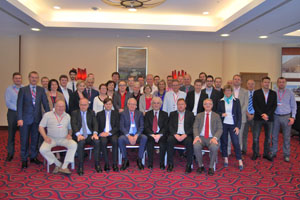EPEXA notes challenges for European poultry producers

EPEXA, the Association of European hatching eggs, one-day olds and pullet exporters in the EU, representing their members of 13 Member States, founded in 1987, held its 26th General Assembly in Krakow on 6 – 9 June 2013.
The president of EPEXA, Jacques de Lange, laid out in his speech the challenges for European poultry producers. He highlighted the important issues that members had reported. Incidents of animal diseases in countries both inside and outside the EU are interfering with the planning of individual businesses. As a consequence the traders of hatching eggs and day old chicks are faced with situations, both positive and challenging. The president posed to the group the question of how the future would look, will there be a different retail landscape in Europe with the potential rise of products such as the Kip van Morgen – the chicken of tomorrow – in The Netherlands? To remain successful in the future EPEXA will study the joining of forces with the associations representing the hatcheries (AEH) and breeders (EPB) in the interest of the European live poultry sector.
In 2012 the European Union exported more than 800 million hatching eggs to third countries of which 6 million were from turkeys, and more than 120 million one-day olds of which 15 million from turkeys. The total annual trade value of hatching eggs including the intra-community trade of about 860 million hatching eggs amounts at more than 415 million euros.
The legislative veterinary officer dealing with bilateral international relations in the European Commission, Ramunas Freigofas, shared his experience and knowledge in the sanitary and phytosanitary area. EPEXA members took the opportunity to exchange and discuss with him the impact these issues will have on their activities. The food business operators and the competent authority in the Member States have the competence to make sure that the import requirements set by third countries EU trade partners are met. The European Commission is responsible to negotiate the SPS component of bilateral trade agreements with third countries. The support of the European Commission is very welcome and with the involvement of EPEXA it will improve the competitive power towards third countries that are expanding their poultry production.
Maciej Przyborski, vice-president of the Polish association KRD-IG, explained the success of the Polish poultry business since the accession to the EU. He questioned if and where there would be a limit to the production capacity in Poland since up until now the poultry sector in Poland continues to grow. There are different factors that are influencing the competitiveness and the exchange rate of the Polish Zloty may not be underestimated. Overall the expectation for the future remains optimistic.













